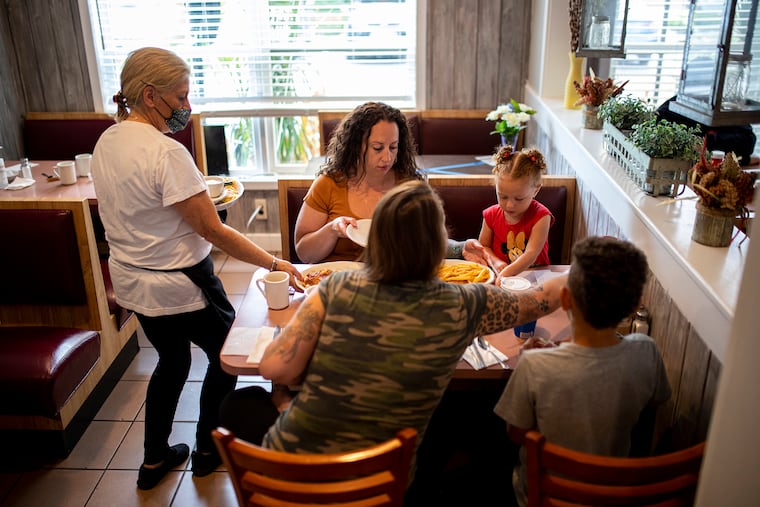Contracting COVID-19 inside is likelier than experts thought | Coronavirus Newsletter
Plus, the vaccine offers hope for Philly’s health care workers

TL;DR: A high school student in South Korea was infected with the coronavirus after five minutes of exposure to a contagious person with no symptoms — who was sitting 20 feet away in an air-conditioned restaurant, according to a new study that shows getting COVID-19 at an indoor gathering is likelier than experts once thought. The coronavirus vaccine is being given to health care workers in Pennsylvania, New Jersey, and other states across the county and the first health care workers in Philadelphia received their vaccinations Wednesday.
— Ellie Silverman (@esilverman11, health@inquirer.com)
What you need to know:
🚫 In Pennsylvania, indoor dining is banned and casinos, gyms, and other indoor entertainment venues are closed until Jan. 4. But some businesses say they’re staying open anyway.
😷 Philadelphia Mayor Jim Kenney is no longer in quarantine after testing negative for the coronavirus on Friday. He announced last week he had been exposed to someone with the virus.
🍽️ The Inquirer’s restaurant critic Craig LaBan recently visited Zahav’s yurt village and says the setup shows the possibilities and disparities of winter outdoor dining.
📚 College faculty are experiencing rising rates of stress and burnout due to COVID-19. “Educators hurt when their students are hurting,” one expert said.
💰 Congress is close to an agreement on a new round of coronavirus stimulus checks that would provide direct payments to Americans and extend federal unemployment benefits.
📰 What’s going on in your county or neighborhood? We organized recent coverage of the coronavirus pandemic by local counties and Philly neighborhoods mentioned in the stories to make it easier for you to find the info you care about.
Local coronavirus cases
📈The coronavirus has swept across the Philadelphia region and cases continue to mount. The Inquirer and Spotlight PA are compiling geographic data on tests conducted, cases confirmed, and deaths caused by the virus. Track the spread here.
The coronavirus vaccine is being given to health care workers in Pennsylvania, New Jersey, and other states across the county and the first health care workers in Philadelphia received their vaccinations Wednesday. Still, cases continue to rise across the region and officials have estimated most people would not be immunized until the late spring or early summer. Erica Harris, an emergency room physician at Einstein who was among the first at the hospital to get a dose of the Pfizer vaccine, said she felt “an enormous amount of privilege,” adding, “I know there are a lot of people who really want this vaccine.” See photos of today’s vaccinations here.
A high school student in South Korea was infected with the coronavirus after five minutes of exposure to a contagious person with no symptoms — who was sitting 20 feet away in an air-conditioned restaurant, according to a new study that shows how getting COVID-19 at an indoor gathering is likelier than experts once thought. Both people were not wearing masks, but they had no direct or indirect contact like touching the same plate or doorknob, according to the findings published in the Journal of Korean Medical Science.
Helpful resources
These 8 principles of social distancing can help you figure out what you can and can’t do.
If you’ve hit a COVID-19 wall, here are ways to cope.
The coronavirus is mainly transmitted through the air. Here’s how to tell if your ventilation is OK.
How does the virus affect your entire body?
Here’s what to know about traveling safely during the pandemic.
You got this: Wear your mask — even after you get the vaccine
There seems to be an end in sight — the coronavirus vaccine is being distributed to health care workers — but experts say mask wearing will continue well into 2021. My colleague Grace Dickinson spoke to Philadelphia experts about how the COVID-19 vaccine works and why masks are here to stay.
🦠 Can my employer require me to get the COVID-19 vaccine? Here’s what you need to know.
🍸 The best places in Philly to buy cocktail (and mocktail) kits.
🍪 Holiday cookie decorating gets a sprinkle of charm and culture in this gingerbread recipe.
Have a social distancing tip or question to share? Let us know at health@inquirer.com and your input might be featured in a future edition of this newsletter.
What we’re paying attention to
How effective is the mask you’re wearing? The New York Times says the CDC is working to develop minimum filter efficiency standards.
Experts warn that one-quarter of the world may not get a COVID-19 vaccine until 2022, Stat reports.
America’s biggest companies are flourishing during the pandemic but put thousands of people out of work, a Washington Post investigation found.
Enjoy getting our journalism through email? You can also sign up for The Inquirer Morning Newsletter to get the latest news, features, investigations and more sent straight to your inbox each morning Sunday-Friday. Sign up here.